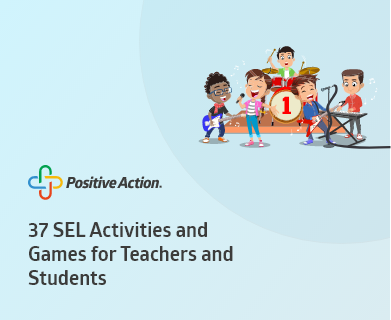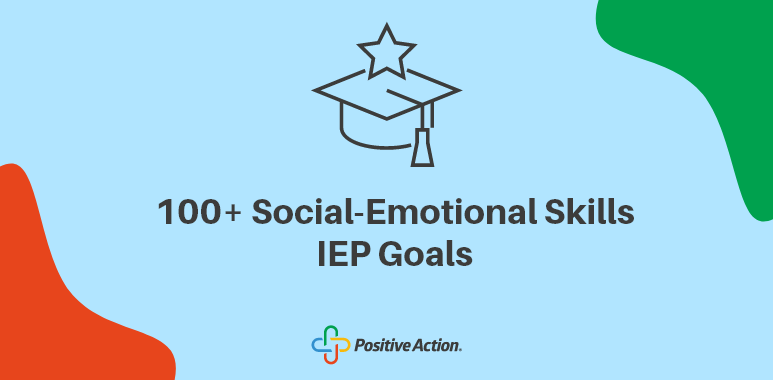
The Five Social Emotional Learning (SEL) Core Competencies [+ Teaching Lessons]
In terms of teaching SEL to both children and adults, this is centered around improving your ability to access and use 5 essential core competencies. Although the competencies are all linked, they can be worked on in a variety of ways, with socio-emotional learning curricula providing the tools with which to hone these competencies.
What are Social Emotional Learning Competencies?
The five core competencies of social-emotional learning are designed to provide a clear framework from which to teach skills that will benefit students throughout their lives in situations ranging from school and work to families and other communities.
These competencies were selected for their ability to accurately pinpoint the skills required to succeed in multiple areas of life, ranging from achieving academic goals to feeling more confident in social interactions.
Nurturing these core competencies within individual students through social and emotional learning is a healthy and rewarding process that can subsequently have a positive effect on the groups of people that these students belong to.
The 5 core SEL competencies
- Self-Awareness
- Self-Management
- Responsible Decision Making
- Social Awareness
- Relationship Skills
These competencies each focus on abilities vital to the social-emotional learning (SEL), and can be worked on through a variety of methods.
1. Self-Awareness
Self awareness is the ability to consider and understand your own emotions, thoughts, values, and experiences, and how these can influence your actions. Improving your self-awareness can allow you to more effectively identify your individual strengths and weaknesses in a range of areas, and therefore potentially improve your decision making and self management (two other core competencies).
Recognizing how your thoughts and feelings impact your behavior can encourage you to make positive changes in your life, and take the perspective that will provide new insight into your own decisions, interests and actions. Within the five core competencies, self awareness is essential as it not only fosters optimism and responsible decision-making, but it also provides a foundation to establish and maintain healthy relationships with others.
Self-Awareness Lesson: Be Honest With Yourself
Positive Action teaches self-awareness through an underlying philosophy that runs through seven units as the basis of all materials. The philosophy, which is taught in Unit 1, is that you feel good about yourself when you do positive actions.
This is brought to a conscious and practical level through a Thoughts-Actions-Feelings about Self- Circle which depicts how thoughts lead to actions and actions to feelings about yourself and then back to thoughts.
The Self-Awareness competency is instructed specifically in Unit 5, where students learn by being honest with themselves, they can accurately assess one’s strengths and limitations.
2. Self-Management
The self-management core competency focuses on an individual's ability to regulate and control their emotions, thoughts and behaviors. For example, this can mean improving areas like stress management, organizational skills, goal-setting abilities, impulse control, and self-discipline.
As well as leading to more responsible decision-making and a greater awareness of safety concerns, improving your self-management can enhance your academic performance, work productivity, and relationships.
Utilizing a positive self-management strategy within an SEL teaching framework can take many forms, and is usually about self-reflection and undertaking a realistic evaluation of yourself so you can then take further actions (including those outlined in other competencies) constructively and positively.
Self-Management Lesson: Develop Impulse Control
The seven units that form the Positive Action SEL curricula all teach self-management. There are also specific units that apply directly to the self-management:
Unit 1 - Intrinsic motivation is taught through the philosophy and the Thoughts-Actions-Feelings Circle: you feel good about yourself when you do positive actions which assumes correctly that you want to feel good about yourself.
Unit 3 - Is specifically termed “Self-Management” and teaches that there are personal resources we all have to manage to feel good about ourselves, including our thoughts, actions, feelings (anger, fear, worry, jealousy, loneliness, anxiety and others).
This helps students address impulse control. Improvement in self-management and impulse control is a key link to positive academic and social-emotional success for students, and a highly functioning classroom environment.
Students are also taught that by managing other resources like their time, energy, money, possessions and talents, they will feel good about themselves and feel like they have more control over what happens to them in school and life.
Unit 6 - Lessons teach setting short- and long-term goals for your intellectual (academic) and personal goals for physical, social-emotional selves. The unit also teaches that you reach your goals by believing in your potential, having courage to try, turning problems into opportunities, and persisting (grit).
Grit, goals, perseverance, and a growth mindset help turn student dreams and wants into reality. All seven units are about managing yourself by using positive actions for your whole self and are taught through multiple methodologies to illustrate and reinforce self-management concepts.
3. Responsible Decision Making
Responsible decision-making is the ability required to make positive and constructive choices based on individual and social factors like personal and academic goals, ethical standards, safety concerns, and social norms. It requires you to consider the consequences of different potential actions, understand your strengths and limitations, and know when to ask for more help when needed in making certain important decisions.
As people navigate day-to-day life, they are required to make decisions both large and small in a broad variety of different situations, that all need attention and consideration for a positive outcome.
This may relate to how you choose to pursue your own personal goals, for example achieving certain school grades based on your strengths and limitations or improving your overall attitude, or it may pertain to social situations like choosing to take the perspective of another person or actively putting more time and energy into maintaining healthy relationships.
Responsible Decision-Making Lesson: Make Positive Decisions
Responsible decision-making is both explicitly taught in Unit 2 and implicitly emphasized across all seven units. This includes learning how to distinguish between positive and negative choices and recognizing them in various aspects of oneself, such as the physical, intellectual, social, and emotional domains. In Unit 2 students in select grade levels are also taught how to use “The Problem-Solving, Decision-Making Checklist”.
4. Social Awareness
The social awareness competency is about improving skills like your ability to empathize with others, your ability to take the perspective of those in different situations to you, your awareness of other diverse individuals and groups, and your ability to make sure you are treating others fairly.
This can help you to establish and maintain healthy relationships and social interactions, and therefore have a positive impact on your family, school, and community, especially when undertaking social-emotional learning within these groups.
With regards to equity and diversity, greater social awareness can assist your ability to understand the perspective of and empathize with other individuals, particularly surrounding characteristics like gender, race, religion, age, culture, class, and financial circumstances, and will ensure that your ability to make decisions in social settings like school takes diversity into account.
Social Awareness Lesson: Relating to Others
Unit 4 teaches students the ability to take perspective and empathize with others from diverse backgrounds and cultures. Positive interactions are based on competencies that are promoted by SEL, like empathy, respect, kindness, listening actively, cooperation, and fairness.
In this unit, Positive Action SEL also teaches understanding social and ethical norms for behavior by teaching the Golden Rule, an established norm for behavior, which is to treat others the way you would like to be treated.
In Unit 1, students are taught through SEL to be aware of who influences and supports them in school, family, and community and to turn to them when they are in need. Beyond just social awareness in individual interactions, students learn to develop a social web of connections.
5. Relationship Skills
The relationship skills competency concerns your ability to make positive connections with others, as well as your ability to take their emotions into account in different situations and social interactions, in order to establish and maintain healthy, mutually rewarding relationships.
This encompasses a range of skills, such as active listening, clear and effective communication, discerning appropriate and inappropriate social conduct, willingness to compromise, capacity to acknowledge and respect the emotions, thoughts, and values of others, as well as the ability to view situations from another person's perspective and empathize with them.
As well as in personal situations with family and friends, relationship skills are important at school with peers and teachers, and in professional areas with colleagues and bosses. If you have the ability to make positive relationships with those you learn and work with, you are contributing to a more positive school or work environment.
Relationship Skills Lesson: Treating Others How You'd Like to Be Treated
The same principles that are taught in Unit 4 for social awareness are at work in building relationship skills. Teaching students to treat others the way they like to be treated is fundamental to building positive relationships. The focus is on the other person, instead of yourself, and how to treat them positively, and when that happens, relationships will work better.
Positive Action has a Conflict Resolution Plan, that supports SEL, integrated into Unit 4 that teaches students how to resolve conflicts by looking at some main ways they like to be treated and asking them if they are treating the others involved in the conflict that way i.e., are you being respectful to others, empathetic, kind, cooperative, fair and listening actively? If they find they are not, they try to correct it.
Conclusion
The five SEL competencies (self-awareness, self-management, responsible decision-making, social awareness, and relationship skills), are vital to the teaching and understanding of social and emotional learning at school. All these competencies are integrated into the Positive Action program to ensure students are equipped with the necessary skills to lead happy, fulfilling, and positive lives.










